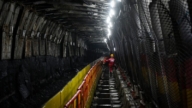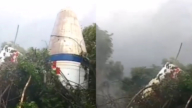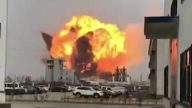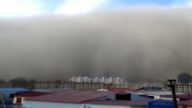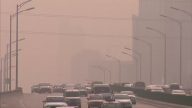【新唐人2014年01月18日讯】日前,美国国会一个委员会举行了一场听证会,重点讨论中共当局如何与周边国家争夺水资源。委员会主席罗拉巴克甚至批评说,中共常常恶意操纵水资源,以达到政治恐吓的目地。 听证会上还有证人指出, 虽然世界上有许多共享水资源的协议,但是中共在这个问题上,不愿意与其它国家进行协商。
《美国之音》16号报导,这场听证主题为“水资源潜在的地缘政治威胁”,由美国众议院外交委员会的欧洲、欧亚与新兴威胁小组委员举办。
委员会主席、共和党议员罗拉巴克说,中共对水资源的控制应该引起世界警觉。他说,许多人可能并不清楚,水资源可以用来恶意操纵,以达到物资与政治恐吓的目地。中共就常常使用这种手段。
民主党议员基廷提到,过去70年,有37起水资源争端引发暴力,而同一阶段,国际社会协商签署了大约3百项水资源协议。
但是证人莫拉•莫尼汉说,中共在进入21世纪后,却大肆开发西藏自然资源,修建铁路、在流入南亚和东南亚的河流上游修建水坝。她认为,虽然世界其它地区,有过很多通过协商解决水资源的例子,但是中共并不准备就西藏水资源的运用和任何人进行协商。
旅美政论家伍凡:“中国采取对邻国,资源几乎垄断的政策。因为中国的地理优势是,从西藏高原下来的水,几条大江。现在中共控制了西藏高原的水源头,它要充份利用。 中国会不会为水跟南部国家打仗,现在很难预料。”
美国情报机构2011年预测,今后10年,许多与美国相关的国家将遭受缺水,水质下降等问题。基廷认为,水资源引起的争议不可避免,不过他相信可以通过协商、合作来解决。
北京水污染环保自愿者、民间水专家张峻峰:“毕竟作为一个国家来说,(中共)不应该仅仅考虑自身的经济发展,更应该多考虑一些周边和全球的整体变化,但是这种认识究竟在管理层面和决策层面,能不能有比较清晰的认识,我是抱着怀疑态度。”
近年来,由于洪灾、旱灾更加频繁的出现,中国国内的水纠纷事件也愈演愈烈。 数据显示,目前中国人均水资源量为2,100立方米,约为全球平均水平的28%。
伍凡:“中国用水浪费的非常大,没有合理使用。用化肥、用农药,土地的污染,水源污染,搞的很多水不能使用,不能喝。造成缺水以后,这个社会制度也不行。”
去年,当局发布了全国水利普查。普查显示,20世纪90年代以来,政府资料库里28,000条河流消失,仅剩不足23,000条河流。但水利普查并未给出河流消失的原因。
美籍华人律师、作家章家敦公开批评,由于中共多年来对水资源管理不善,才造成危机。
而旅居德国的水利环保生态学专家王维洛博士,早前在接受《希望之声》采访时指出,中国很多水资源的问题是人为造成的。
王维洛以北京为例,他表示,现在很多中国专家声称水资源最缺乏的是北京,实际上,北京在历史上的水资源却很丰富。以前永定河的水,每年能供给北京15到20亿立方米的水。但是中共夺权后,开始向苏联学习造水库,而且越建越多。由于水库加大了水面面积,蒸发也就增加了。
同时,他观察到, 北京的自来水有30%以上是在管道里漏掉,但是当局并不去解决这个问题,因为这并不能增加GDP。
张峻峰:“北京市的政府层面,出台了比较严格的关于水资源使用的一些措施,但我觉得力度还是远远不够, 还是远远达不到对水资源遏制、过度使用的状况。”
到过很多国家的王维洛表示,没有一个国家像中国那样,在缺乏水资源的情况下,还污染水、浪费水。为了钱,中共可以把自己的生活环境都破坏了,不仅不懂得尊重自然,更没有敬天爱地。
采访/陈汉 编辑/王子琦 后制/李勇
U.S. Congress Hearing: the CCP Maliciously Manipulates Water Resources
Recently, a subcommittee of U.S. Congress held
a public hearing regarding the Chinese Communist
Party (CCP) authority’s aggression towards
surrounding countries over water resources.
Dana Rohrabacher, the chairperson of the subcommittee,
criticized the CCP authority’s malicious manipulation
of water resources for the purpose of political intimidation.
Maura Moynihan, a witness at the hearing, pointed out that
although there are many agreements in place between certain
nations regarding the sharing water resources, the CCP
is unwilling to negotiate on this topic with other countries.
On Jan. 16 Voice of America (VOA) reported on the hearing’s
topic, “the Potential Geopolitical Threats of Water Resources"
sponsored by the House Committee on Foreign Affairs’
Subcommittee on European, Eurasia and Emerging Threats.
Subcommittee Chairman Rohrabacher,
a republican lawmaker, says that the world should watch
the CCP’s control of water resources.
He says that many people may not be clear about the fact
that water resources can be maliciously manipulated
for the purpose of material and political intimidation.
The CCP authority often uses such means.
Democrat Representative William Keating mentioned
that during the past 70 years, 37 violent incidents have
ensued due to water resource disputes, however 300 water
resource agreements have been signed around the world.
But witness Maura Moynihan pointed out that the CCP
developed Tibet’s natural resources on a large-scale,
constructed railways, and built upstream dams on the rivers
running into South Asia and South East Asia.
She thinks, despite many successful cases of resolved water
disputes via negotiation, the CCP authority is unwilling
to negotiate the use of Tibetan water resources
with any pertinent downstream countries.
U.S.-based Chinese political commentator Wu Fang:
“China implements a policy of monopolizing resources
without care of surrounding countries.
China has a geographic advantage in that several major rivers
originate from a Tibetan plateau.
Now the CCP controls the origin of water
at the Tibetan plateau and uses them.
It is hard to predict whether China will fight for water
resources with those countries to its south."
In 2011, U.S. intelligence agencies predicted that
in the next decade, many countries relevant to U.S.
will suffer water shortage, water quality deterioration
and other issues.
Keating believes disputes resulting from water resources
are inevitable, but that they can be solved with negotiation
and cooperation.
Beijing nongovernmental water expert and water pollution
prevention volunteer Zhang Junfeng: “As a country,
(the CCP) should not only be able to consider its own
economic development, it should be able to be more
considerate of the changes in surrounding countries
and the entire world.
However, in my opinion, I doubt that the administrative level
and decision-making level of the CCP authority
has a relatively clear understanding of this situation."
In recent years, due to more frequent floods and droughts,
water resource disputes in China have intensified.
Data shows that China’s per capita water resources average
at around 2,100 cubic meters, 28 percent of the global average.
Wu Fan: “Waste of water in China is very serious,
unreasonable use of water is out of control.
The use of fertilizer, pesticide, as well as the land and water
pollution causes unusable water in many regions.
This produces water scarcity,
and the fundamental reason is the regime."
Last year, the CCP authority issued the results
of the National Water Resources Census, which shows
that since the 1990s 28,000 rivers in the official database
have disappeared and less than 23,000 rivers remain.
But the reason for such a huge number of disappearing rivers
is not given by the census.
U.S.-based Chinese lawyer and writer Gordon Chang
publicly criticizes the CCP for poor management of water
resources for such a long period of time, which has resulted
in a crisis.
German-based Chinese ecologist Dr Wang Weiluo
pointed out that many Chinese water resource problems
were anthropogenically produced.
Taking Beijing as an example, Wang Weiluo says many
Chinese experts state Beijing had the most serious water
shortage in China, but historically Beijing was a city with
rich water resources.
In the past the water from Yongding River could supply
Beijing with 1.5 to 2.0 billion cubic meters of water annually.
However, after the CCP seized power, Beijing began to build
increasingly more reservoirs following the Soviet Union.
Because reservoirs expand the water surface area,
evaporation correspondingly increases.
At the same time, he observed, 30 percent of running water
in Beijing has leaked out of pipelines,
but local authorities do not attempt to solve the issue
because they cannot increase the GDP.
Zhang Junfeng: “Beijing Municipal Government issued
more stringent measures regarding water usage, but I think
the enforcement is far from sufficient,
over-use of water resources has not been contained."
Wang Weiluo, who has visited many countries,
says that there are no other countries like China
that pollute and waste water under the circumstances
of a water shortage.
In order to pursue money, the CCP chooses to destroy
the country’s living environment.
The CCP does not understand respect of mother nature,
nor respect of heaven and love for the land.
Interview/ChenHan Edit/WangZiqi Post-Production/LiYong


